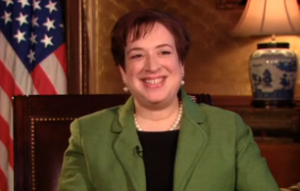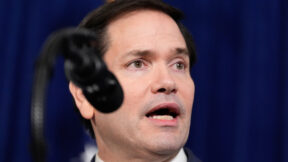Elena Kagan: Way Too Boring For Scandal-Starved Media
 It must have been a virtual scream on newsroom/blogger computer screens around the nation. The moment it became clear that President Obama would be nominating Elena Kagan, editors simultaneously posing the same and obvious question: What do we really know about her? Of course, it is a far more loaded question than it seems. Yes, her background as a New York-born Harvard Law grad and Dean who was most recently Solicitor General of the United States is of interest. Oh, and she spent two years at Oxford, too. Yeah, yeah, yeah… but they want to know what we really KNOW about her. What is the dirt? What are her most controversial comments, articles, positions? Does she hate our country?
It must have been a virtual scream on newsroom/blogger computer screens around the nation. The moment it became clear that President Obama would be nominating Elena Kagan, editors simultaneously posing the same and obvious question: What do we really know about her? Of course, it is a far more loaded question than it seems. Yes, her background as a New York-born Harvard Law grad and Dean who was most recently Solicitor General of the United States is of interest. Oh, and she spent two years at Oxford, too. Yeah, yeah, yeah… but they want to know what we really KNOW about her. What is the dirt? What are her most controversial comments, articles, positions? Does she hate our country?
Was she ever a late term abortion provider? Did she once compare Speaker Nancy Pelosi to David Duke?
After all, her comments and writings on the really important issues like the First Amendment, Executive Power and the Commerce Clause are, well…kinda nuanced. She may want cameras in the Supreme Court? Whatever. She opposed the military’s Don’t Ask Don’t Tell policy and consequently tried to keep recruiters off campus? A good start — but far more controversial just a few years ago. Come on, they don’t quite need the pubic hair on a Coke can, but the media is looking for at least a “Wise Latina” meme to obsess over for a few weeks.
Alas, thus far no dice. These specks of spongy legal dirt do not exactly offer fleshy and easily understandable outrage that serves as the media’s lifeblood. Even questions about her sexuality have, fortunately, been relegated to those analyzing how the media should cover it and not as a substantive issue that would impact her nomination.
It seems this controversy vacuum is now leading to overt frustration expressed on both sides of the media political aisle. From Glenn Greenwald to Glenn Beck, Ezra Klein to Erick Erickson, columnists, bloggers and pundits are now bemoaning the dearth of public statements on crucial issues or legal rulings to examine ahem, controversy. Don’t be fooled by those suggesting a limited paper trail should somehow serve as a disqualifying factor. It’s not and, of course, shouldn’t be — it’s just the only sword many partisans seeking a legal road map from her could muster thus far.
Always trying to appear objective, the mainstream media has its own brand of bias: an institutional one towards controversy. They are looking to dig up a topic du jour and it’s hard work keeping the archaeological effort going. For them, its not about defeating or supporting the nomination as much as it is about adding spice to the chili. They seek to find some controversy, often tangential, that opponents of the nomination will then pounce upon as proof of the nominee’s unfitness for the job while exclaiming that the ‘people have a right to know’. It is a sometimes dysfunctional but certainly symbiotic relationship.
There’s no question she is tougher to peg than many. With seemingly conservative views on executive power, for example, and more liberal ones on discrimination based on sexual orientation, partisans on both sides are on edge. What about her views on Roe v. Wade? The Second Amendment? On the scope of the Commerce Clause which may determine the constitutionality of President Obama’s Health Care legislation? It’s fair enough to want to know (and Kagan herself has mocked non-responsive nominees in the past), but let’s not be too shocked if we can’t find out until she’s on the Bench. Many of our most celebrated justices, Brennan and Frankfurter, Stevens and even John Marshall himself, turned out differently than just about anyone expected. Its just not that horrifying to nominate a true legal scholar who might actually evaluate cases individually and even surprise us.
Look, I am certainly not one to thumb my nose at those looking to cover salacious stories. After all, I have spent much of my career covering the OJ Simpsons, Michael Jacksons and Scott Petersons of the world.
I relish a good-layered scandal. But one might hope that for the mainstream media, in particular, covering a Supreme Court nomination would be different, more substantive, more nuanced, and less frustrated at the fact that sometimes a seemingly boring candidate might be just what the President ordered.
This is an opinion piece. The views expressed in this article are those of just the author.





Comments
↓ Scroll down for comments ↓